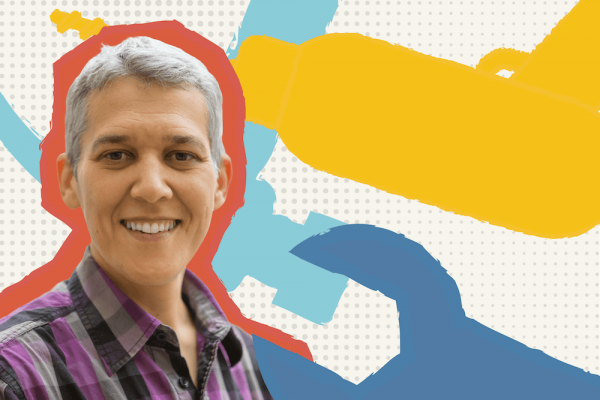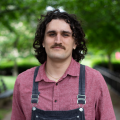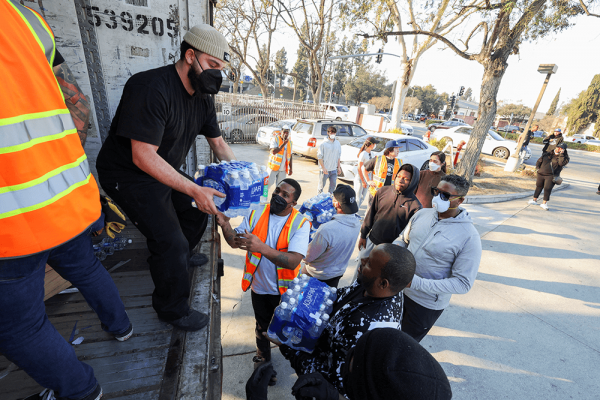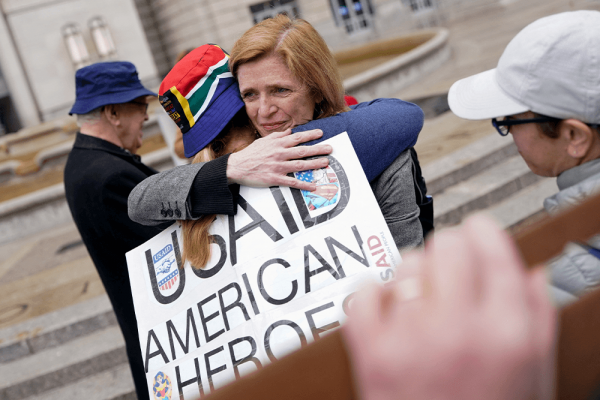This interview is part of The Reconstruct, a weekly newsletter from Sojourners. In a world where so much needs to change, Mitchell Atencio and Josiah R. Daniels interview people who have faith in a new future and are working toward repair. Subscribe here.
For many living in the U.S., Israel’s ongoing attack on Gaza — along with Israel’s occupation of the West Bank and the treatment of Palestinians living in its borders — is horrific on multiple levels.
First, it is horrifying to see so much death, destruction, and oppression. Second, it is horrifying to know the United States helps fund (to the tune of billions of dollars) Israel’s actions and supplies the weapons that are being used to kill thousands. For many people, they feel like there is little they can do to affect these policies. Dov Baum knows that something can be done.
Baum is the director of corporate accountability and research for the American Friends Service Committee where she leads projects to research and target corporations and industries funding or benefitting from oppression. This includes companies benefitting from Israel’s apartheid, but also the companies funding the police training facility known as “Cop City” in Atlanta.
Baum is also an Israeli, now living in Oakland, Calif., who has refused to serve in the Israeli military and is a member of the group Israelis Against Apartheid. Baum and I spoke on Nov. 8, before Israel and Hamas’ temporary cease-fire had begun and ended. We spoke about her work in economic activism, corporate accountability, and I asked her about the effort of some to identify anti-Zionism as antisemitism.
This interview has been edited for length and clarity.
Mitchell Atencio, Sojourners: How did you become an Israeli against apartheid?
Dov Baum: I lived in Israel most of my adult life. I arrived in the U.S. only about 12 years ago, and I became an anti-occupation activist while working and living in Israel.
My journey of awakening included being involved in the feminist movement in Israel and meeting Palestinian women through the feminist movement in the ’90s. It was a slow journey of discovery, of realizing that I didn’t live where I thought I lived. It’s like going through the mirror glass to the other side and relearning everything that I thought I knew about my country.
I’ve been with others doing this journey at the same time. It came to fruition with the outbreak of the second intifada in the early 2000s when many of us, in my generation, had been pushed into doing direct action and working with Palestinian communities as they were struggling against the construction of the apartheid wall on their lands. We were fortunate enough to be invited by Palestinian farming communities to resist with them. This was the most important political school for me. Like many other Israelis — and most other Israeli Jews — I served in the Israeli military, I went through the Israeli educational system, I celebrated Zionist occasions and holidays even when I thought I was a progressive. I didn’t really know or understand the Palestinian experience or narrative.
Back in the early 2000s, I had the whiplash experience of going back and forth between sitting in a cafe in Tel Aviv and demonstrating with the Palestinian community, empty handed, in front of the armed military that I used to serve in. It taught me very crucial lessons about being part of a Palestinian-led movement. It is not simple. It is not easy. The roles that we can play in such a movement and how to navigate the big differences and code switching between different narratives and stories — no, more than stories, the way people experience themselves — in different communities around me.
And I’m experiencing all that today, even more powerfully. I have friends and family who lost people in the attack by Hamas on Oct. 7. I have colleagues and friends in Gaza who were bombed by the Israeli attack. I go to demonstrations against the genocide in Gaza because I want to be with others that shout and call for the immediate stop of this unforgivable crime. And I cannot chant all the chants in those demonstrations. I chant some of them.
I am aware of the fact that we choose [what] to give voice to, participate in, or feed. I am wary of all the attempts to demonize and dehumanize other people because we see this leading to great harm.
Why is “apartheid” the right word to describe Israel’s policies now and before Oct. 7?
There are plenty of legal experts that have put effort into analyzing whether Israel’s legal strictures and formations are in line with the definition of the crime of apartheid as recognized by international law. Major human rights organizations have published reports before the current crisis. Palestinians used the language years ago. The late Bishop Desmond Tutu compared the situation in Palestine to the situation of South African apartheid. There was a flurry of reports published by Amnesty International; Human Rights Watch; by B’Tselem and Yesh Din, two Israeli human rights organization; and by Al-Haq, a Palestinian human rights organization.
And it’s not really about comparison to South Africa; it’s about understanding that the inequities and disparities between the two peoples, [Israelis and Palestinians], are part of the legal system. Anyone living in Israel knows that. It is true inside what is called “[1948] Israel” and it is even more true, and very visible, in the West Bank. You have hundreds of thousands of Israeli Jews living as settlers in the West Bank, you have millions of Palestinians who live on the West Bank, and [the two groups] are subject to two different sets of laws.
Beyond that, there is systematic inequality that is enforced by semi-legal structures. [This includes] discrimination in access to housing or certain services inside Israel, allowing unofficial discrimination by institutions that will police the movement or the access of Palestinians to areas or to bank loans, etc.
I know that in the U.S., talking about “Jewish supremacy” sounds suspect because Jews make a small minority in this country and there is a lot of Christian hegemony. But in the Israeli setting, Jews definitely enjoy a dominant position. There is Jewish supremacy that is [Israel’s] version of white supremacy.
I do have a question about Christian hegemony for later on, but before that, I want to ask about your role with the American Friends Service Committee, which is a Quaker organization focused on just peace, economics, and migration. What sort of work do you do for AFSC?
Back in the early 2000s, I was involved in groups that were going out and joining the Palestinian movement against the construction of the separation wall … At the time I was working for an organization called the Coalition of Women for Peace, inside Israel. We were faced with the dilemma of how to respond to the call from the entire Palestinian civil society to use nonviolent tools such as boycott, divestment, and sanctions on Israel — considering that we were Israeli and inside the Israeli society and economy.
One idea we came up with was to establish a new research project, “Who Profits from the Occupation.” We tried to identify specific companies that were involved in specific human rights violations as part of the Israeli occupation. There was a very wide agreement among activists in our movement that corporations were not playing a positive role. And that there’s no way for us to make a difference as long as there are such huge economic interests involved in the continuation of the occupation, repression, checkpoints, separation, and suppressing the Palestinian economy. We also found out that there was no information about [the corporations] out there.
Today “Who Profits from the Occupation” has become an independent research institute. I’m no longer involved with it, but I’m proud.
Here in the U.S., AFSC has established the Action Center on Corporate Accountability, which looks into similar questions in Palestine, but also in other places around the world, including in the United States. We try and track corporate interests in mass incarceration, mass surveillance, the militarization of the U.S.-Mexico border. And, surprise, many times these are some of the same large corporations that are involved in all of the above, though not in all cases. Our research is not academic. We really want to deeply understand: How can we make them stop? “We” being the movements that are working with communities on the ground, led by the most impacted people.
[We’re] working with stakeholders of the companies involved, such as investors or big partners or consumers, and with grassroots movements and communities. We’re trying to bridge that gap and give activists the tools they need in order to remove companies.
What are some of the successes you have had in economic activism and corporate accountability?
There’s a lot of intimidation from large corporations, from multinationals that have so much power politically and economically. [People ask] “Can we sway them?” Yes. Part of the lesson we’ve learned over the years is that companies are actually quite malleable, because they are so risk averse. So, over the years, the movement has actually had dozens of successes.
One of our most recent campaigns asked General Mills to stop sourcing some of their products from a factory in an illegal Israeli settlement. And they have; they divested from Israel and sold off General Mills Israel altogether. This was during COVID-19, and we didn’t know if we could do much, but the Israel-Palestine controversy is such that companies don’t want to become the symbol of the occupation, and that is a good thing.
We’ve had many other successes [that] had to do with [companies] stepping away from business in the occupied Palestinian territory … including companies such as Unilever and SodaStream. One of the campaigns that lasted the longest was [against] a company called G4S that used to be the second largest private security firm in the world — it was bought off by Allied Universal, another giant private security firm — but not before G4S divested and sold off its Israeli subsidiary.
This is also deeply Quaker. Quakers started the movement to boycott slavery goods many centuries ago. Quakers invented divestment by adopting the first “sin screens” against weapons or investment in weapons. The idea that we need to walk the walk.
Returning to the topic of Christian hegemony, we have an audience of Christians who are more progressive and many of them are concerned with Palestine and Israel. On the one hand, you spoke about how some of the chants at pro-Palestine protests are not ones you feel comfortable chanting. On the other hand, groups like the Anti-Defamation League are saying that anti-Zionism is antisemitism. So, what should U.S. Christians know about antisemitism, particularly in the context of working for Palestinian liberation?
It’s a difficult question for me because I grew up as an Israeli Jew in Israel, being part of a hegemonic group. I didn’t grow up as a Jew in the United States, and I never count myself as an expert on antisemitism — I’ve actually encountered very little antisemitism here in the Bay Area.
But antisemitism is a real thing. I want to ask Christians or people of faith to [investigate] that. It’s a good invitation for them to do the soul searching required to find out what motivates them in the work they do. Work with your spiritual guides or leaders to find out if you are working for Palestinian rights out of hatred or love. What motivates you?
Identifying Zionism with Judaism is in fact Zionist. It’s the Israeli state that keeps claiming that it represents the Jewish people as a whole. And many Jews disagree with that, as we see in the news with the vast mobilization of Jews that really oppose Israeli actions today. And many Israelis, inside the Israeli state, don’t agree with the state policies. And many Israelis inside the Israeli state are not Jewish — 20 percent of the population of Israel is Palestinian and there are many others who are not Palestinian or Jewish who also live inside the Israeli state.
It’s really important for people to pause, especially white Christians, and check their motivations. It is even more important then that once they understand where they’re coming from, they should speak out. Speak out against Israeli policies and against Zionism. Especially right now, to stop the genocide in Gaza, because that’s urgent. And they should do it regardless of potential harm to their relationship with the institutional Jewish community, fear of controversy, or anything like that, because that is a moral obligation. I think the confusion about antisemitism is used as an excuse for inaction, and that’s immoral.
[…] I think there is a tendency in the white solidarity movement to also dehumanize Palestinians, by making them tokens of human suffering. And radical compassion means sometimes having our critique and listening. We can listen to the things that we don’t agree with and have compassion, [asking], “What is this person actually telling us?” Many times, they’re telling us they want their humanity recognized.
I have been trying to build more compassion for Jews in Israel or the diaspora who genuinely feel that Israel is the last safe place for Jews, and how that may have been taken away after Oct. 7. Though to Christians, or people like President Joe Biden who make that argument, I want to say, “Yeah, and whose fault is that? What have we done to make the world unsafe for Jews?”
I will add: Israel is not the safest place for Jews. In fact, Israel is one of the most unsafe places for Jews and has been so for the last few decades. Because this is the place where there is constant violence, and it is built on the Palestinian Nakba of 1948. It is built on such a crime that it has to sustain violence in order to sustain itself. And that means it can never be safe, unless it is going through a process of decolonization and democratization.
Deep down, I think most Israeli Jews know that. I think now it’s up on the surface, because — let’s face it, 70 percent of the population in Gaza are refugees from inside Israel, on the border of Israel, or living in or under occupation. And they were not contained by the high-tech, 21st-century, digital, “smart walls” that were erected around Gaza. They burst those walls and butchered civilians.
This is about the fact that there are all these millions of people who are dispossessed, who are living on their land, and [Israel] cannot contain them. We will never be able to contain that because all people want to live in freedom. And that means that Israel can never be a safe haven for the Jews until it becomes safe for Palestinians.
Got something to say about what you're reading? We value your feedback!







